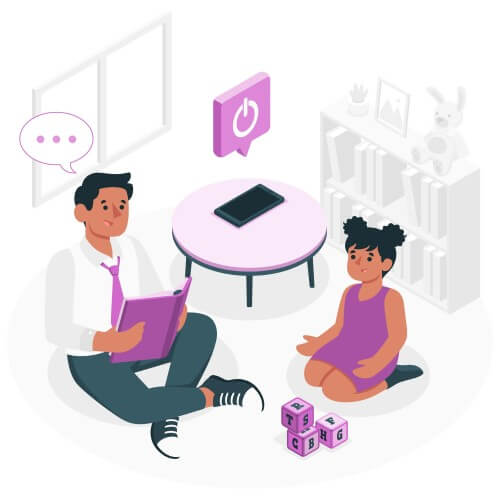How does screen time affect your child’s development?
By Prapoorna M
Last Updated: June 13, 2023
In today’s digital age, screens have become an integral part of our lives, with children being exposed to them at increasingly younger ages. While technology offers numerous benefits, concerns about the impact of excessive screen time on children’s development have arisen. This article explores the effects of screen time on child development, emphasizing the importance of setting limits and providing guidance.
I. Cognitive Development:
a. Attention and Concentration:
Excessive screen time can disrupt a child’s ability to focus and sustain attention. The fast-paced, constantly changing nature of digital content can create a preference for immediate gratification, leading to reduced attention spans. This can hinder academic performance and impede the development of critical thinking and problem-solving skills.
Also Read: How to Improve Attention and Concentration in Studies?

b. Language and Communication:
Excessive screen time may hinder language development in young children. Real-life interactions, face-to-face conversations, and exposure to a rich vocabulary primarily drive language acquisition. Overreliance on screens can limit these essential experiences, affecting a child’s language skills and ability to communicate effectively.
Learn more about on Unlocking Communication: Effective Speech Therapy for Autism
c. Cognitive Skills:
Screen time can impact the development of cognitive skills, including memory, reasoning, and information processing. Passive consumption of media content, such as watching videos or playing mindless games, may limit opportunities for active engagement and intellectual stimulation. This can hinder the development of higher-order thinking skills necessary for academic success.
Explore our article on Learning Techniques for Students

II. Social-Emotional Development:
a. Social Skills:
Excessive screen time can impede the development of crucial social skills. Face-to-face interactions allow children to learn empathy, emotional regulation, and non-verbal communication. Excessive screen time, particularly in isolation, may limit these interpersonal experiences, leading to difficulty in forming and maintaining relationships.
Read more on How to build emotional connections and maintain positive relationships with children?

b. Emotional Well-being:
Research suggests a link between excessive screen time and poor emotional well-being in children. Social media can contribute to feelings of inadequacy, anxiety, and depression. Constant exposure to carefully curated and often unrealistic portrayals of others’ lives can create an unhealthy comparison mindset, negatively impacting self-esteem and mental health.
Learn more about on Anger Management for Children
c. Empathy and Compassion:
Excessive screen time may reduce opportunities for children to develop empathy and compassion. Digital interactions lack the depth and nuances of face-to-face interactions, making understanding and empathizing with others’ emotions challenging. This can hinder the development of essential social skills, leading to decreased social awareness and concern for others.
Know more about Effect of love and compassion in our life

III. Physical Health:
a. Sedentary Lifestyle:
Excessive screen time often leads to a sedentary lifestyle, reducing physical activity and exercise opportunities. Prolonged sitting and inactivity can contribute to obesity, cardiovascular problems, and musculoskeletal issues. Encouraging outdoor play and engaging in physical activities can counterbalance the sedentary nature of screen time.
Also Read: Tips to Develop Good Learning Habits
b. Sleep Disruptions:
Screen exposure, particularly before bedtime, can disrupt a child’s sleep patterns. The blue light emitted by screens interferes with the production of melatonin, a hormone that regulates sleep. Insufficient sleep can impact cognitive function, emotional well-being, and overall health, emphasizing the importance of establishing screen-free bedtime routines.
c. Vision Problems:
Extended screen time, poor ergonomics, and improper viewing distances can strain a child’s eyes and contribute to vision problems. Conditions such as digital eye strain, myopia, and dry eyes have become increasingly common among children who spend excessive time in front of screens. Regular breaks and proper eye care practices can mitigate these risks.
Recommendations for Healthy Screen Time Habits :
Healthy screen time habits are crucial for maintaining overall well-being in today’s technology-driven world. Here are a few recommendations to promote a balanced approach to screen time. Firstly, it is important to set limits on daily screen usage for both children and adults. Designating specific time limits for different activities, such as educational apps like SPEECH BASICS or AUTISM BASICS, recreational screen time, and interactive play, can help individuals maintain a healthy balance. These apps can be valuable tools to assist children with speech development or support individuals with autism in improving their social and communication skills. However, it is essential to ensure that screen time is used mindfully and purposefully, with regular breaks and time for other activities.
Additionally, it is crucial to prioritize limited shared screen time with parents. While technology can be useful for entertainment or educational purposes, excessive shared screen time can hinder family communication and interpersonal connections. Instead, parents should encourage dedicated face-to-face interactions without screens to foster emotional bonding and effective communication skills. By engaging in activities like reading books, playing outdoors, or participating in family discussions, parents can create opportunities for quality time and strengthen family relationships. While apps like SPEECH BASICS and AUTISM BASICS can be beneficial tools, balancing their usage with offline activities that promote social interaction and emotional well-being is important.
Strategies for Healthy Screen Time Habits
| Strategy | Description | Actions | Benefits |
|---|---|---|---|
| Set Daily Limits | Implement time limits for different activities to encourage a healthy balance. | – Determine a total daily screen time limit. – Use timers or apps to monitor usage. – Allocate specific times for screen use. | – Helps prevent excessive screen time. – Encourages a diverse daily routine. – Reduces the risk of screen dependency. |
| Prioritize Shared Screen Time | Use screen time to enhance family bonding while minimizing solitary use. | – Schedule regular family movie nights or game sessions. – Engage in educational apps together. – Discuss content viewed to promote critical thinking. | – Strengthens family relationships. – Provides opportunities for learning together. – Enables parents to guide digital content engagement. |
| Encourage Offline Activities | Promote physical activities, reading, and creative hobbies to reduce screen dependency. | – Plan daily outdoor playtime. – Set aside time for reading books. – Provide materials for arts and crafts. | – Supports physical health. – Stimulates imagination and creativity. – Enhances cognitive development and literacy skills. |
| Balance with Educational Content | Select high-quality educational apps and content to support learning. | – Research and choose apps based on educational value. – Limit recreational screen time in favor of educational content. – Involve in interactive learning experiences rather than passive watching. | – Promotes academic skills. – Encourages active rather than passive engagement. – Tailors screen time to developmental needs and interests. |
The Reality of average screen time of Children at an early age:
According to Statista polls on the media consumption behaviours of children and young people, 92% of persons aged twelve and above use their cell phones regularly. WhatsApp takes the lead among their favoured activities, closely followed by major social networking platforms such as Instagram and TikTok. It was discovered that teenagers aged 6 to 11 spend an average of 111 minutes daily on the Internet, while adults aged twelve and above spend an average of 204 minutes. These values far exceed the recommended screen time restrictions. However, it is crucial to remember that when young people come together, they frequently participate in activities like viewing films or playing console or internet games. As a result, solitary screen use is only valid in certain situations.
Appropriate usage for using screen time by age.
I. Age Group: 0-3 Years
A. Understanding Early Brain Development – Rapid brain development occurs during the first three years of life. – Excessive screen time can impede crucial cognitive, language, and social-emotional development. B. Recommendations for Appropriate Usage – The American Academy of Pediatrics (AAP) suggests avoiding screens altogether for children under 18 months, except for video chatting. – For children aged 18-24 months, limited and high-quality educational content can be introduced with active parent or caregiver participation. – Screen time for children aged 2-3 years should be supervised and focused on educational content, limited to 1 hour per day.
II. Age Group: 3-6 Years
A. Cognitive and Social Development – Rapid language development, problem-solving skills, and social interactions characterize this stage. – Excessive screen time can hinder cognitive growth, impair social skills, and limit imaginative play.
B. Recommendations for Appropriate Usage – The AAP suggests limiting recreational screen time to no more than 1 hour per day for children in this age group. – Prioritize interactive and educational content that fosters language development, creativity, and social skills. – Encourage a balanced routine with various activities, including outdoor play, reading, and hands-on experiences.
III. Age Group: 6-9 Years
A. Cognitive and Emotional Development – Improved cognitive abilities, expanded interests, and social interactions mark this stage. – Excessive screen time can impact attention span, academic performance, and emotional well-being.
B. Recommendations for Appropriate Usage – Set consistent limits on recreational screen time, considering school responsibilities, physical activity, and sleep. – Promote educational and age-appropriate content that fosters critical thinking, problem-solving, and creativity. – Encourage a healthy balance between screen time and offline activities, including hobbies, sports, and face-to-face social interactions.
IV. Age Group: 9-12 Years
A. Cognitive and Social Development – Increased cognitive abilities, growing independence, and peer relationships define this stage. – Excessive screen time can impact academic performance, social skills, and physical well-being.
B. Recommendations for Appropriate Usage – Establish consistent limits on recreational screen time, considering individual needs and balancing priorities. – Encourage various activities, including physical exercise, reading, creative pursuits, and social interactions. – Foster responsible digital citizenship, teaching online safety, media literacy, and ethical online behaviours.
Recommended Screen Time by Age Group
| Age Group | Recommended Screen Time | Types of Activities | Additional Guidance |
|---|---|---|---|
| 0-3 Years | – Video chatting only under 18 months – Limited high-quality content for 18-24 months – 1 hour/day for 2-3 years | – Video chatting with family – Educational apps and programs | – Engage with the child during screen time to help understand and interact with the content – Ensure content is age-appropriate and educational |
| 3-6 Years | No more than 1 hour of recreational screen time per day | – Educational games and videos – Storytime apps or videos | – Screen time should not replace time spent on physical activity, reading, and creative play – Parents should watch together to discuss the content and its application to the real world |
| 6-9 Years | Consistent limits considering school and physical activity | – Homework-related research and activities – Age-appropriate games, videos, and educational content | – Screen time should complement physical activity, adequate sleep, and offline hobbies – Encourage content that promotes learning and creativity |
| 9-12 Years | Balance recreational screen time with physical and social activities | – Educational projects and research – Safe social networking under supervision – Creative content creation | – Monitor and discuss online safety and digital citizenship – Encourage a healthy balance of activities, ensuring time for face-to-face social interactions, outdoor play, and family time |
Conclusion:
While screen time has positive and negative effects on child development, it is crucial to strike a balance and provide guidance and supervision. Limited shared screen time with caregivers can foster bonding and facilitate educational experiences. Recognizing the potential negative impacts, setting guidelines, and encouraging various activities can help mitigate any detrimental effects. By prioritizing healthy screen time habits, we can ensure that technology enhances rather than hinders our children’s development.
Moreover, Wellness Hub understands the unique challenges and opportunities presented by the digital age. We believe in the power of informed choices and the importance of nurturing well-rounded individuals who can navigate both digital and physical worlds with ease and confidence. Wellness Hub is here to guide you every step of the way. Together, we can ensure that technology acts as a bridge to learning and growth, rather than a hurdle to overcome, making the journey of parenting in the digital age a little easier and a lot more rewarding.
Frequently Asked Questions:
1. How does excessive screen time affect a child’s cognitive development?
Excessive screen time can disrupt a child’s ability to focus, reduce attention spans, hinder language development, and limit the growth of critical cognitive skills such as memory, reasoning, and problem-solving.
2. What are the social-emotional consequences of too much screen time for children?
Children with excessive screen time may experience difficulties in developing social skills, face challenges in emotional well-being including increased feelings of anxiety and depression, and may struggle with empathy and compassion due to reduced face-to-face interactions.
3. How does screen time impact a child’s physical health?
A sedentary lifestyle encouraged by excessive screen time can lead to obesity, cardiovascular issues, sleep disruptions, and vision problems including digital eye strain and myopia.
4. What are the recommended screen time limits for children?
The American Academy of Pediatrics suggests avoiding screens for children under 18 months (except for video chatting), introducing limited high-quality educational content for children aged 18-24 months with active parent involvement, and limiting screen time to 1 hour per day for children aged 2-5 years, focusing on educational content.
5. How can parents promote healthy screen time habits for their children?
Parents can set daily screen time limits, prioritize shared screen time to enhance family bonding, encourage a variety of offline activities such as outdoor play and reading, and ensure screen time is balanced with physical, social, and educational activities.
6. What is the average screen time for children, and how does it compare to recommended limits?
Children aged 6 to 11 spend an average of 111 minutes daily on the Internet, while those aged 12 and above spend about 204 minutes, both exceeding recommended screen time limits. It highlights the importance of setting boundaries and encouraging a balanced mix of activities.
7. Can screen time be educational for children?
Yes, when used mindfully, screen time can support learning and development. Educational apps and content can assist with language acquisition, cognitive development, and provide valuable skills when balanced with active participation and real-world interactions.
8. What strategies can parents use to reduce screen time for children?
Parents can reduce screen time by establishing clear rules and routines for screen use, engaging children in alternative activities that stimulate their interests, and leading by example with their own screen habits. Encouraging outdoor play, creative hobbies, and family activities can also help minimize reliance on screens.
9. How does screen time before bedtime affect children’s sleep?
Screen time before bedtime can significantly disrupt children’s sleep patterns. The blue light emitted from screens inhibits the production of melatonin, the hormone responsible for regulating sleep, leading to difficulties in falling asleep and reduced sleep quality.
10. Can screen time affect a child’s social skills? How?
Yes, excessive screen time can negatively affect a child’s social skills. It reduces opportunities for face-to-face interactions where children learn to interpret non-verbal cues, develop empathy, and engage in meaningful conversations, which are crucial for building healthy social relationships.
About the Author:
Prapoorna Mangalampalli, Psychologist
Prapoorna, an author with dual master’s degrees in Psychology and English, excels in exploring and enhancing human experiences. Her writing, characterized by deep empathy and insight, primarily focuses on the complexities of counseling, spanning areas such as online, marital, relationship, child, family, and career counseling. Specialized training in various counseling sectors underscores her dedication to positive change. In her blogs, Prapoorna offers valuable guidance and a unique perspective for parents of children with Autism and special needs, creating a supportive community in this realm.
Book your Free Consultation Today
Parent/Caregiver Info:
Client’s Details:
* Error Message








